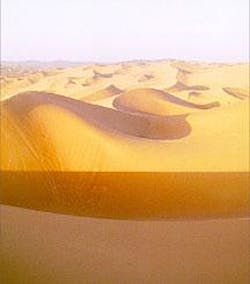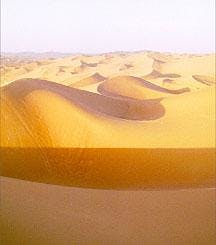Shifting Saudi sands
Shifting Saudi sands
The towering red sand dunes of the Rub' al-Khali stand mute sentinel over the gleaming new facilities at Shaybah, Saudi Arabia's most recent giant oil field to go on stream (OGJ, Apr. 5, 2004, p. 24).
Some of these dunes are well over 600 ft tall, yet they blend in with the massive, trackless expanse that is the Empty Quarter of Saudi Arabia. It is one of the world's largest sand deserts, one of the driest places on earth, and virtually uninhabited.
Last March, a group of journalists touring the Shaybah operations at the invitation of state oil company Saudi Aramco was encouraged to hike the dunes and enjoy the view amid a setting sun.
After the trek to the top of the highest dune, the group's chatter had faded, as if by unspoken mutual assent, into quiet reflection as the sun sought the horizon. At first, one was struck by the remarkable stillness of this forbidding, desolate vastness. It seemed as if nothing had moved for eons. Then came the whisper of a light breeze, and it became apparent that the stillness was superficial—there was movement everywhere, albeit subtle. The red sands shifted constantly, forming little dancing dervishes, snaking along new channels, cascading down when a new precipice was eroded as quickly as it was formed. Now the desert seemed alive with movement.
null
Saudi changes
So it is with Saudi Arabia today. The kingdom often is pilloried for being a closed and extremely conservative society. Indeed, a few days in Riyadh offer ample reminders of a culture not openly comfortable with change. But change there is, and it's happening in many small ways.
The last man to have this editor's title, Bob Enright, at one time in the 1970s spent a fruitless year securing a letter of invitation to meet with the Saudi oil minister, only to be denied a visa at the Bahrain border by another Saudi ministry. Up until recently, the name Saudi Arabia has seemed synonymous with "lack of access" for any journalist.
Saudi Aramco's March press tour, the first of many more promised, was thrown together in a few weeks. There was an improvisational feel to the press tour, unlike some carefully orchestrated programs experienced elsewhere. Officials of Saudi Aramco at every level were surprisingly candid and forthright. Shaybah engineers were expansive with their information and beaming with pride over their accomplishments.
And this time the Saudi oil minister not only was accessible but voluble and even delightfully blunt in an exclusive OGJ interview (OGJ, Apr. 5, 2004, p. 18). Minister Ali I. al-Naimi was quick to emphasize as well the growing importance of natural gas, mainly as an engine for diversifying industrial development (see special report beginning on p. 18). Much emphasis is being made on building job-intensive downstream plastics industries as well as basic petrochemicals.
Al-Naimi was quick to remind also that he is the minister of petroleum and mineral resources and encouraged an interview with Abdallah E. Dabbagh, president and CEO of Ma'aden (Saudi Arabian Mining Co.). Although OGJ doesn't cover hard-rock minerals, it was nonetheless an enlightening opportunity to learn about Saudi Arabia's ambitious plans to become a major producer of bauxite, phosphate, magnesite, and their derivatives, not to mention gold and silver mined at Mahad ad Dahab—which, legend has it, may be the famed King Solomon's Mine.
It still may be the center of the oil universe, but Saudi Arabia is not just about oil any more.
Astraddle the centuries
A glance at the local newspaper on the last day in Riyadh offered a stark contrast to any Western reader: a headline about an expatriate worker being sentenced to 60 lashes and 18 months in prison for uttering a blasphemy—and another headline about the establishment of a human rights commission that would include women.
A culture astraddle the centuries: at a distance, implacable and unchanging; up close, vibrant with many small changes. Like the shifting sands at Shaybah.

